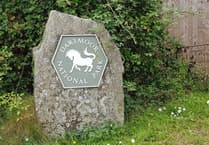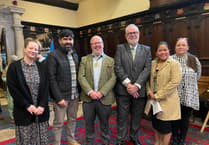THE NEW custodian at the National Trust's Finch Foundry in Sticklepath is young and female but well equipped to do the job in what has traditionally been a male-dominated industry.
With a history degree, a love of heritage and two years experience at a working wool museum Elisabeth Chard, 23, feels confident about taking over the reins from Matthew Applegate, who ran Finch Foundry for three years.
'I worked at Cold Harbour Mill in Uffculme first as a volunteer and then as a museum assistant so I know exactly what it is like working in a small community-involved heritage site,' said Elisabeth.
'Traditionally industrial and foundry sites have been run by men because that was what the workforce was. The majority of staff at Cold Harbour Mill are women and it is nice to see them in roles that were traditionally held by men.'
Elisabeth starts her new job on Monday and will shortly be moving to the Okehampton area from her home county of Somerset.
She said Finch Foundry was a lovely little site with an awful lot of potential.
'It is slap bang in the middle of the community and I want local people to feel it is part of the community.
'It's also the perfect place to cut my teeth as having a museums' qualification the next step is property management.'
She said the job would be a challenge but the site had a lovely atmosphere and a lot of volunteer involvement which was good.
'My real passion is industrial and social history,' added Elisabeth, who is the third custodian at Finch Foundry which was taken over by the National Trust in 1994. 'It is easy to forget all these communities once had to have somewhere where clothes and tools were made.
'At a time when villages are becoming more dormant it is nice to see something which harks back to that heritage still standing.'
Once employing 30 people and producing 400 tools a day, Finch Foundry was bought by the National Trust to secure its future as one of the few surviving waterpowered edge tool works in the country and a living remnant of Dartmoor's industrial history.
It now receives 14,000 visitors annually and is acclaimed as being almost unique amongst National Trust properties having been featured on 'Fred Dibnah's Industrial Age' programme.
The foundry was one of the National Trust properties visited by the charity's new director Fiona Reynolds on Friday during a whistle-stop tour of the area.



